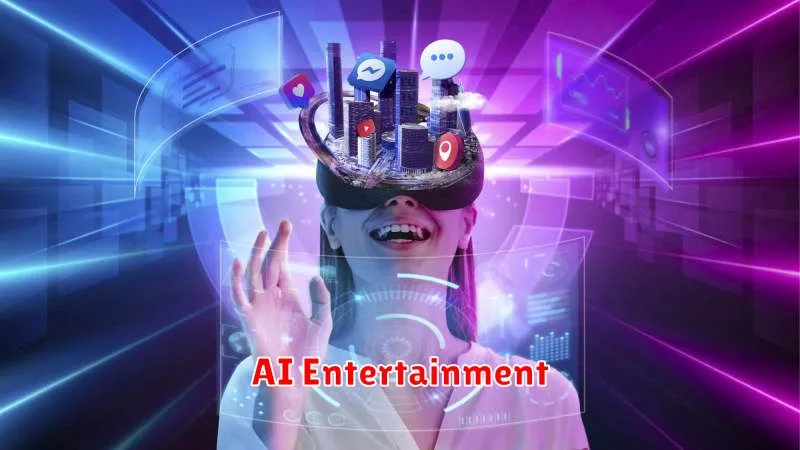The rapid advancement of artificial intelligence (AI) has transformed various industries, and the home entertainment sector is no exception. Smart homes are becoming increasingly sophisticated, integrating AI technologies to deliver unparalleled entertainment experiences. From personalized recommendations to voice-controlled systems, AI is redefining how we interact with our home entertainment systems. This article will delve into the pivotal role of AI in enhancing smart home entertainment, exploring how it’s shaping the future of entertainment and elevating our overall enjoyment.
Imagine a world where your TV automatically recommends movies based on your preferences, your music system adjusts the sound based on your mood, and your smart lights create the perfect ambiance for your movie night. This futuristic vision is rapidly becoming a reality thanks to the power of AI. By leveraging machine learning algorithms and natural language processing, AI-powered smart home devices can understand your needs and preferences, creating a truly personalized and engaging entertainment experience. This article will explore how AI is changing the game in home entertainment, from personalized recommendations to voice control, and everything in between.
How AI is Enhancing Smart Home Entertainment Systems

Artificial intelligence (AI) is rapidly transforming the way we interact with our homes, and entertainment systems are no exception. AI-powered smart home entertainment systems are becoming increasingly sophisticated, offering a more personalized and intuitive experience.
One of the most notable ways AI is enhancing smart home entertainment is through personalized content recommendations. By analyzing user preferences and viewing history, AI algorithms can suggest movies, TV shows, and music that are tailored to individual tastes. This eliminates the frustration of browsing through endless options and ensures a more enjoyable experience.
AI is also improving the user interface and control of smart home entertainment systems. Voice assistants like Alexa and Google Assistant allow users to control their devices with simple voice commands, making it easier than ever to adjust volume, change channels, or play specific content. AI-powered remote controls can also learn user habits and suggest relevant options based on context.
Furthermore, AI is enabling smarter home theater systems. By analyzing ambient light and sound levels, AI algorithms can automatically adjust the screen brightness, sound volume, and even the lighting in the room to create the optimal viewing experience. This ensures that every movie night is a truly immersive and enjoyable one.
The integration of AI into smart home entertainment systems is still in its early stages, but the potential for further innovation is immense. As AI technology continues to evolve, we can expect even more personalized, intuitive, and immersive entertainment experiences in our homes.
The Future of AI in Home Theaters
The home theater is evolving, and AI is at the forefront of this transformation. As AI technology advances, it promises to revolutionize our entertainment experiences in several exciting ways. From personalized recommendations to seamless control, AI is poised to make home theaters smarter, more immersive, and more enjoyable than ever before.
One of the most significant impacts of AI on home theaters is the ability to personalize the viewing experience. Imagine a system that learns your preferences for movies, shows, and music, then automatically recommends new content based on your tastes. AI algorithms can analyze your viewing history, identify patterns, and suggest titles you’re likely to enjoy. This personalized approach eliminates the need to spend hours searching for something to watch, making the entire experience more convenient and engaging.
Beyond recommendations, AI is also transforming the way we interact with our home theaters. Voice assistants like Alexa and Google Assistant are already becoming ubiquitous in homes, and their integration into home theater systems allows for hands-free control. Simply speak a command to adjust the volume, switch inputs, or even dim the lights, all without lifting a finger.
The integration of AI in home theaters is not limited to simple tasks. Advanced AI algorithms can optimize the audio and video settings for your specific room and viewing conditions. These algorithms can dynamically adjust the sound levels, equalizer settings, and even picture settings to provide the most immersive and enjoyable experience possible.
The future of AI in home theaters is bright. As the technology continues to evolve, we can expect even more innovative applications that enhance our entertainment experiences. From personalized recommendations and seamless control to advanced audio and video optimization, AI is poised to usher in a new era of home theater technology, one that is both intelligent and engaging.
Challenges in Implementing AI for Entertainment
While AI presents promising advancements for enhancing smart home entertainment, several challenges must be addressed for seamless implementation. One significant hurdle is the lack of standardized data and interfaces across different entertainment platforms and devices. This fragmentation hinders the development of universal AI models that can effectively integrate with diverse systems. Moreover, privacy concerns surrounding data collection and usage by AI systems are paramount. Ensuring responsible data handling and user consent is crucial to fostering trust and acceptance.
Another challenge lies in ensuring personalized entertainment experiences tailored to individual preferences. AI algorithms need to accurately interpret user preferences and adapt to changing tastes. This requires sophisticated AI models capable of learning and evolving based on user feedback. Furthermore, ethical considerations regarding AI-generated content, such as potential biases and copyright issues, require careful examination. Striking a balance between creative freedom and ethical responsibility is essential.
Finally, the integration of AI with existing entertainment infrastructure presents technical hurdles. Ensuring compatibility with legacy systems and seamless integration with new technologies is crucial. Additionally, user adoption and accessibility remain crucial factors. AI-powered entertainment features must be intuitive, user-friendly, and accessible to a broad audience, regardless of technical expertise.
AI-Powered Personalization in Home Entertainment

AI is revolutionizing the way we experience home entertainment. AI-powered personalization is transforming the landscape by delivering tailored experiences that cater to individual preferences.
Imagine a smart TV that learns your viewing habits and recommends shows based on your interests. Or, a music system that curates playlists based on your mood. These scenarios are becoming a reality thanks to AI. By analyzing your past interactions, AI algorithms can predict your preferences and suggest content you’re likely to enjoy.
AI’s role in personalization extends beyond content recommendations. It can optimize sound and picture settings, adjust room lighting, and even control smart home devices to create an immersive entertainment experience.
The benefits of AI-powered personalization are numerous. You get a more enjoyable and engaging entertainment experience, discover new content, and save time by not having to search endlessly for something to watch or listen to.
Case Studies: AI in Smart Home Entertainment
AI is revolutionizing the way we experience entertainment at home. From personalized recommendations to immersive experiences, AI is enhancing our interactions with smart home entertainment systems. Here are some compelling case studies demonstrating the impact of AI in this domain:
Netflix utilizes AI to personalize recommendations, predict user preferences, and create original content based on viewing habits. The platform analyzes user data, including watch history, ratings, and genre preferences, to suggest content that aligns with individual tastes. This personalized approach enhances user engagement and satisfaction.
Amazon Alexa employs AI to provide voice-controlled entertainment experiences. Users can request music, podcasts, audiobooks, and even control smart home devices with voice commands. Alexa’s natural language processing capabilities allow for seamless interactions, making entertainment access more convenient and intuitive.
Google Home leverages AI to create a smart home entertainment hub. Users can connect various devices, such as smart TVs, speakers, and streaming services, to Google Home and control them with voice commands. The platform’s AI capabilities enable personalized recommendations, multi-room audio, and seamless integration with other smart home features.
Samsung Smart TV integrates AI to enhance the viewing experience. The AI-powered features include automatic scene optimization, voice control, and content recommendations tailored to individual preferences. These features contribute to a more immersive and personalized viewing experience.
These case studies demonstrate the transformative potential of AI in smart home entertainment. By leveraging AI, these platforms provide personalized recommendations, enhance user interactions, and create immersive experiences that elevate the overall entertainment value.
The Impact of AI on Streaming Services
Artificial intelligence (AI) is rapidly transforming the entertainment industry, particularly in the realm of streaming services. AI is playing a crucial role in enhancing user experience, personalizing content recommendations, and optimizing content creation.
One of the most significant impacts of AI on streaming services is the personalization of content recommendations. By analyzing user data, such as viewing history, preferences, and demographics, AI algorithms can suggest tailored content that is more likely to resonate with viewers. This personalized approach increases user engagement and satisfaction, as viewers are presented with content they are more likely to enjoy.
AI is also revolutionizing content creation. Streaming services are utilizing AI to automate tasks like scriptwriting, editing, and even creating entirely new content. This not only reduces costs but also allows for the production of more diverse and innovative content.
Furthermore, AI is enabling enhanced search functionality. By understanding natural language queries, AI-powered search engines can provide more accurate and relevant results. This empowers users to easily discover content that meets their specific interests and preferences.
In conclusion, AI is profoundly impacting streaming services, enhancing user experience, personalizing content recommendations, and optimizing content creation. As AI technology continues to evolve, we can expect even more transformative changes in the way we consume entertainment.

